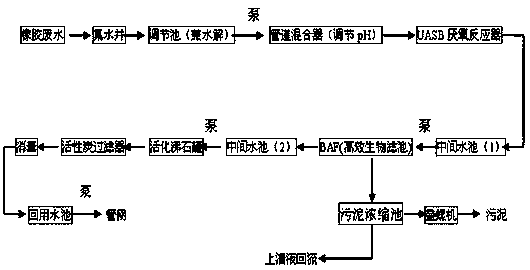A kind of treatment process of rubber waste water
A technology of rubber wastewater and treatment process, applied in water/sewage treatment, water/sewage multi-stage treatment, biological water/sewage treatment, etc., can solve the problems of odor generation, long treatment time, odor in anaerobic section, etc. The effect of processing load, improving biodegradability, and prolonging service life
- Summary
- Abstract
- Description
- Claims
- Application Information
AI Technical Summary
Problems solved by technology
Method used
Image
Examples
Embodiment 1
[0038] Step A: Pretreatment: The rubber wastewater flows into the collection well after removing large particles of impurities through an artificial grid. A dosing system and pH meter are installed in front of the collection well, and a submersible sewage pump is installed in the collection well; then it is lifted to the hydrolysis tank by the pump and adjusted The hydrolysis tank is equipped with a submersible mixer to mix the water quality and remove part of the organic matter under the action of facultative microorganisms;
[0039] Step B removes most of the organic matter and total phosphorus: the wastewater treated in step A is pumped into the UASB tank, and after anaerobic digestion, the UASB tank consists of a sludge reaction zone, a gas-liquid-solid three-phase separator (including a sedimentation zone) It consists of three parts and gas chamber;
[0040] Step C to remove COD and BOD: the wastewater treated in step B flows into the intermediate pool (1) by itself, stays for...
PUM
 Login to View More
Login to View More Abstract
Description
Claims
Application Information
 Login to View More
Login to View More - R&D
- Intellectual Property
- Life Sciences
- Materials
- Tech Scout
- Unparalleled Data Quality
- Higher Quality Content
- 60% Fewer Hallucinations
Browse by: Latest US Patents, China's latest patents, Technical Efficacy Thesaurus, Application Domain, Technology Topic, Popular Technical Reports.
© 2025 PatSnap. All rights reserved.Legal|Privacy policy|Modern Slavery Act Transparency Statement|Sitemap|About US| Contact US: help@patsnap.com

